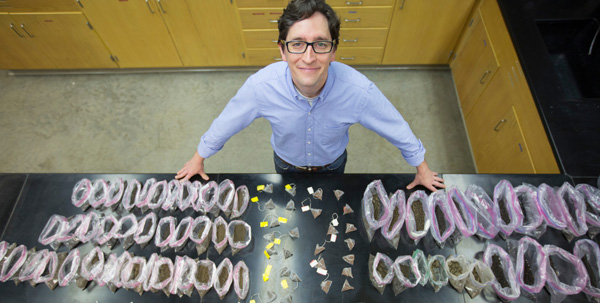
Tea Time for Soil Health
The system of microorganisms and enzymes in soil are a key factor in how plants take up nutrients for growth. It’s a complex system. Marshall McDaniel’s research in the Department of Agronomy is trying to uncover a simple way to gauge soil health—soil’s decomposition ability.
“The faster soil can decompose material, the faster it can make those nutrients available to the plants,” says McDaniel. “Our goal is to give farmers an easy, inexpensive way to gauge how well their soil breaks down plant matter.”
How? Bury tea bags.
Standard brewed tea bags are readily available, inexpensive and typically weigh the same regardless of name brand. A high-quality tea serves as a control since almost any soil system will be able to successfully decompose its perfect combination of carbon and nitrogen. However, the ratio of carbon and nitrogen in poor-quality tea is less than ideal. This imbalance tests the ability of soil microorganisms because poor-quality tea requires more inputs, like carbon, from the soil to breakdown.
McDaniel, an assistant professor, is studying soil’s decomposition ability in traditional cropping rotations and those with the addition of cover crops. He partnered with Practical Farmers of Iowa and has nine sites on privately owned farms and one site on Iowa State University land. The project is funded by The Leopold Center for Sustainable Agriculture.
“We haven’t done a deep analysis of the data yet, but early results show soil microbes improve even after just one year of a cover crop,” says McDaniel. “If the critical analysis confirms it, our next question will be, ‘why?’”
McDaniel wanted to get farmers involved by testing something they were curious about on their own farms. The project involves seven farmers burying and collecting tea bags themselves, as citizen scientists. One of these farmers is Nathan Anderson (’10 agronomy).
“I was immediately intrigued,” says Anderson. “There are a lot of soil tests advertised, but this was low cost and the method was simple, straightforward and easy to implement.”
On Anderson’s farm, they are running five trials in the same type of soil. Three row-cropped fields have very different yield productivity. The two additional sites are in a rotationally grazed pasture and established alfalfa field.
“I wanted to see what else might be going on from a biological standpoint that could be contributing to the differences we’re seeing,” says Anderson.
A simple soil test like the one McDaniel has created can help farmers set soil health goals and gauge their progress. As a farmer, Anderson says one of the most beneficial aspects of the tea bag test is the timeliness.
“It’s going to give us a quicker report card for some of the tools we’re using for soil health, like cover crops,” says Anderson. “It has the potential to be a game changer in terms of measuring progress.”



